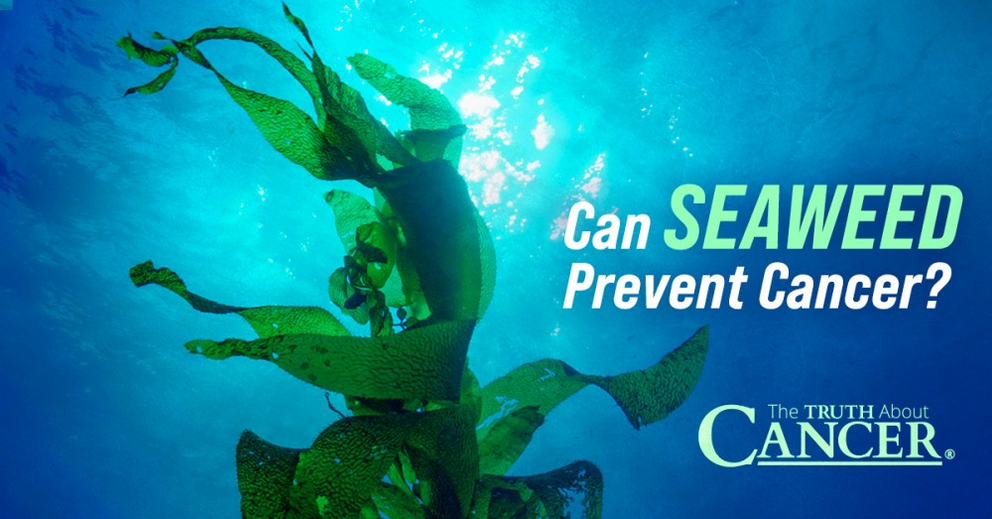Can seaweed prevent cancer?
Edible seaweed (also known as sea vegetables or ocean vegetables) are an unexpected powerhouse of nutrients. Generally, edible seaweed is a great source of fiber, calcium, potassium, iron, and iodine. Depending on the variety, it can also be a valuable source of vitamins and minerals such as, vitamin A, vitamin B, vitamin C, vitamin E, vitamin K, copper, zinc, manganese, magnesium and selenium. But did you know that certain types of sea vegetables can also provide an alternative cure for cancer?
What Makes Seaweed an Anti-Cancer Food?
Certain types of edible seaweed have an anti-carcinogenic property. Among them are the brown seaweeds such as the kelps and wracks. The anti-carcinogen constituent of these brown sea vegetables is called fucoidan. This natural compound can also be found in other varieties of sea vegetables such as the limu, wakame, kombu, and mozuku. About 4% of the dry weight of seaweed contains fucoidan.
A group of Japanese researchers at the Biomedical Research Laboratories discovered that fucoidan induced anti-tumor activity in mice when they introduced it to their animal models. The researchers observed that this seaweed extract effectively activated a process of natural cell death, referred to as apoptosis, among leukemia, lymphoma, stomach and colorectal tumor cells. But that’s not all… fucoidan has also been found to build up the immune system and regulate the body’s cholesterol levels.
Another study further confirmed that the extract from brown seaweeds help fight cancer. Based on the study of the Hashemite University in Jordan at the AACR Dead Sea International Conference on Advances in Cancer Research, the fucoidan extract contributes to apoptosis or programmed cell death. Cancer cells had either shrunk or were completely destroyed.
Kombu and wakame are regarded as rich sources of fucoidan enzymes. These types of sea vegetables are abundant in Okinawa, Japan. The residents of Okinawa made the record of having the lowest cancer mortality rate because of the tradition of eating uncooked kombu wherein the fucoidan enzymes are concentrated. Although other Japanese cook their kombu, Japan has lower breast cancer rates compared to western countries. This is possibly due to the consumption of fucoidan-rich seaweeds.
Kombu and wakame also have the capacity to make cancer cells self-destruct. In a Japanese research trial, when the laboratory technicians administered the fucoidan enzyme to a petri dish containing cancer cells, the results were complete destruction of all cancer cells within three days. The researchers concluded that the cancer cells were destroyed by the fucoidan enzymes.
Are you fond of eating seaweed? Or maybe you’re never tried it. Aside from being an anti-cancer fighting food, these nutritional benefits may persuade you to become an advocate of eating ocean vegetables:
1 | Seaweed has an alkalizing effect. Our modern lifestyle has greatly affected your diet. Much of what is eaten today is acidic in nature and that’s definitely not beneficial for your health. In order to help restore your body’s pH level, you need to eat more alkaline foods such as seaweed.
2 | Seaweed may be better than milk. Seaweed is ten times richer in calcium than your favorite milk! And it is eight times better than eating beef.
3 | Seaweed help purify our blood. The chemical composition of these ocean vegetables is similar to that of your blood plasma; hence, eating seaweed is a great way to keep your blood free from toxins.
4 | Seaweed is rich in chlorophyll, especially the green seaweed. Chlorophyll is the green pigment coloration that makes sea vegetables green. Chlorophyll is a natural and powerful detoxifying agent that helps eliminate toxins and other waste pollutants from your body.
5 | Seaweed can help you achieve a shaped body. Since seaweed is naturally rich in iodine, it helps your thyroid gland to maintain a healthy metabolism which is needed in regulating your body weight. Eating ocean vegetables can help you lose weight because it breaks the chemical bonds of fat cells.
6 | Seaweed can support you in stressful times. Seaweed contains magnesium, pantothenic acid, and riboflavin which are necessary for producing enough energy to face the stressful and tough day ahead.
5 Ways to Add Ocean Veggies in Your Menu
If you want to benefit from this superfood, you can prepare ocean vegetables in many different ways. You can create healthy and delicious meals with sea veggies using the following suggested menus:
- Do you love to have eggs or omelets for breakfast? Add a new flavor to your breakfast dish by sprinkling diced seaweed such as nori on top.
- Blend sea vegetables in your soup. For a more unique texture in your soup, you can mix some carefully sliced or powdered seaweed. If you’ll be preparing either a cioppino soup or clam chowder, a sprinkling of seaweed will do the trick.
- Create crunchy seaweed chips. If you want a snack that’s low in calories but with lots of fiber, crunchy sea vegetable chips will be perfect for you. It’s MUCH healthier than a bag of potato chips.
- Create a classic seaweed salad. You may slice cucumbers and green onions along with your healthy ocean veggies. Mix them together with a rice-wine vinegar, a bit of soy sauce, and sesame oil. You may also add ginger paste for extra flavor.
- Make a seaweed sushi roll. If you want to have a taste of the eastern sushi with dried nori, you may reinvent the sushi recipes to match your taste buds.

